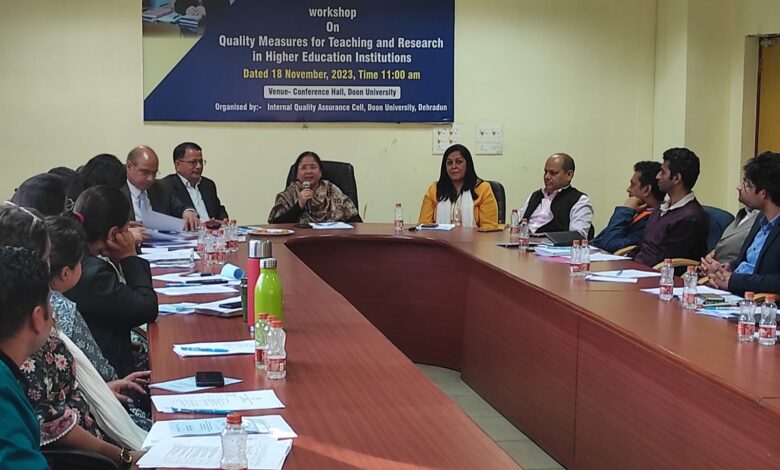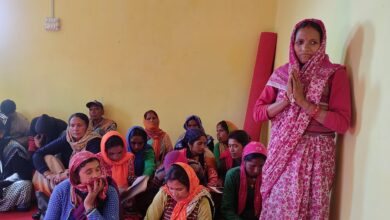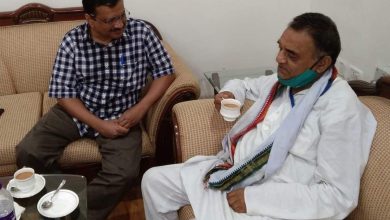Commitment, Dedication of teachers in the development of educational institutions: Experts


Experts at an academic workshop in Doon University emphasised on the need for maintaining high quality measures for teaching and research in higher education institutions, innovations and keeping with the spirit of the National Education Policy 2020 while making optimum use of new Information Communication Technologies.
Addressing the teachers in a one-day workshop on ‘Quality Measures for Teaching and Research in Higher Educational Institutions’ organized by the Internal Quality Cell of Doon University, Vice Chancellor Professor Surekha Dangwal said that the dedication and commitment of teachers is important in the development of any educational institution. She said that a teacher is called a nation builder because it is under his guidance and supervision that the future society and the nation develops. “Therefore, there is a need that in the modern technological era, teachers should continuously develop their knowledge and skills and make students aware of various aspects of new techniques and technology every day so that study can become interesting and for this we will have to acquaint ourselves with these new technologies,’’ Professor Dangwal said.
The Vice Chancellor said that the quality of research and teaching in the University is continuously moving towards excellence and we all have to work with more dedication to take it to greater heights. “A teacher is a role model for his students and the teacher’s personality remains imprinted in their minds forever,” Professor Dangwal said.
Doon University Registrar Dr M S Mandrawal said that the University is always conscious and striving towards creating a good environment for the quality of education and research and this workshop is a part of that process.
Prof. Rajendra P. Mamgain, Dean, School of Social Sciences shared his experience-based thoughts on building a vibrant academic environment within universities. Underlying the focus of the NEP 2020 on multidisciplinary higher education, Prof. Mamgain argued for developing work culture and continuous lifelong learning and training among faculty. He gave tips to promote work culture and efficiency though promoting organizational goals, focus on research-based teaching and learning, offering voice to students—listening their ideas and valuing such ideas, developing knowledge networks for academic progress and promoting constructive criticism while coming forward to take up any responsibilities assigned related to academic development.
Unravelling the relationship between India’s civilisational/spiritual knowledge systems and today’s educational landscape, Dean of the School of Management, Professor HC Purohit emphasised that teachers had been the role models of the society since time immemorial. Even in the medieval period, Kabir Das had stated that the Guru had utmost importance in one’s life. In the modern times, Guru is the nation builder, the teacher works to give direction to the society, hence he can set an ideal.
Prof. Rajesh Kumar, Dean and Head of the School of Media and Communication Studies talked at length about different measures to improve teaching & research in Higher Education Institutions (HEIs) stating that for a significant improvement in teaching and research certain quality measures comprising formulation of quality indicators, ensuring its compliance, conformity assessment and continuous and comprehensive monitoring & evaluation are required.
Drawing examples from his own experiences, he emphasized on some of the specific measures to improve teaching, such as adoption of modern teaching techniques & tools, interactive teaching, outcome based pedagogy, interdisciplinary approach in teaching, teaching for profession & skill development, continuous curriculum enhancement and so on.
Professor S.S. Suthar, Dean of the School of Environment and Natural Resources, threw light on several aspects of conceptualising, planning writing and publishing quality research papers. Emphasising on the quality of research, Dr Suthar pointed towards common mistakes made by authors while writing and communicating research paper to a journal. He also gave tips to find suitable journal for possible publications of research papers.
In his presentation on “Streamlining Research Information and Academic Activities Using Different Platforms,” University Librarian Professor Ashish Kumar focussed on optimizing research and academic endeavors through various identification and management platforms. The first segment delved into Researcher IDs, including Scopus ID, Researcher ID, Vidwan ID, IRINS ID, and Orcid ID, elucidating how these unique identifiers facilitate seamless tracking of scholarly contributions, enhance collaboration, and establish academic profiles. The second part of the presentation centered around platforms specifically designed for Ph.D. supervisors to effectively manage and maintain the progress of Ph.D. candidates and research scholars. ShodhChakra, a platform tailored for this purpose, was highlighted as a tool that aids in supervisory tasks, streamlining communication, and ensuring the smooth functioning of the research process.
Highlighting the “Emerging Challenges for Teaching and Research in the times of Social Media,” Professor Harsh Dobhal of School of Media and Communication Studies, emphasised that in the times of social media and with the introduction of online teaching and digital content a new set of challenges have emerged. “The basic idea of the existence of the class room, in other words, is being debated. And with that the role of the teacher and the idea of the student is also changing. Today the screen and the internet have forced us to reconsider whether the class room can continue to be the basic format for conveying university education, and if yes, then teachers have to walk extra miles to preserve the relevance of a classroom,” Professor Dobhal said.
The particiapnts were welcomed and introduced by Dr. Himani Sharma, Head of the Physics Department. Professor Reena Singh coordinated the program and presented the vote of thanks. On this occasion, many teachers including Dr. Arun Kumar, Dr. Narendra Rawal, Dr. Swati Bisht, Dr. Rajesh Bhatt, Dr Preeti Mishra, Dr Varun Dev, Dr Vipul Goswami, Dr Shanky Chandra, Atul Shah, Dhriti Dhaundiyal, Priyank Singh and others were present.






Yes. Under NEP-2020, we will be having an interactive/participatory programmes using various pedagogical techniques & methodologies. It had life-long impact upon student.